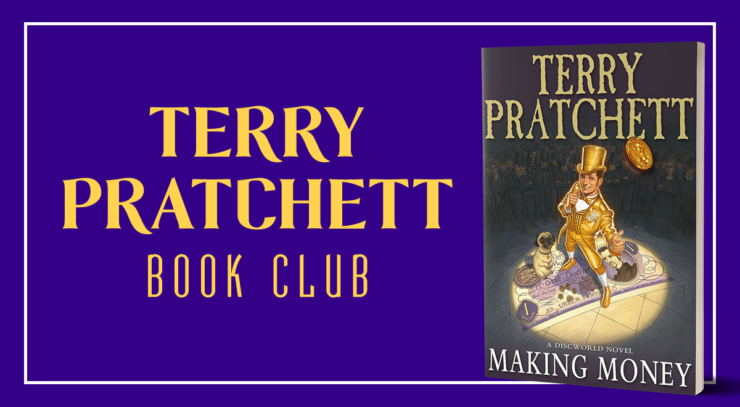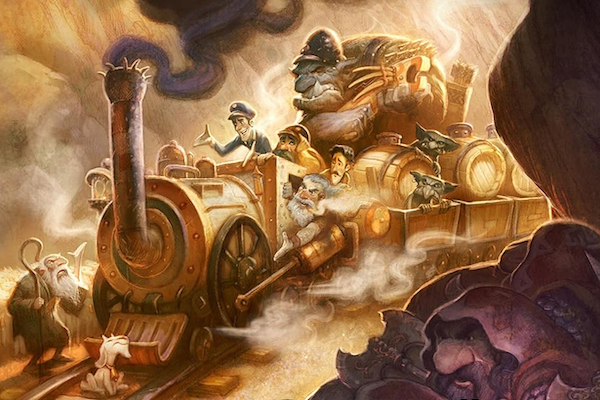Hope y’all are ready for me to get mad about capitalism a whole bunch, sorry, it’s not my fault…
Summary
There is a group lying in wait in the dark somewhere. Three weeks ago, Adora Belle Dearheart offered up a great deal of money to lease dwarf land for unknown reasons. Moist von Lipwig is already bored of his life and nearly gets caught scaling the Post Office Building (he’s part of a shadowy nighttime climbing fraternity). He’s an upstanding citizen now, with his picture in the paper, and calls to testify against conmen forging stamps. At a meeting with Lord Vetinari, he’s asked if he would like the opportunity to make some real money, but Moist insists that he’s very happy at the Post Office and scurries away. He goes back to work, looking through meeting minutes, signing forms, letting Tiddles the cat in and out of his office, walking through the place. The job isn’t exciting anymore. Gladys the golem informs him that Vetinari’s coach is waiting outside, and Moist keeps him waiting for a long while before breaking down and going to find out what this is all about. Vetinari informs him that he has a new proposition for Moist’s employment: master of the Royal Mint. He wants Moist to take control of the bank of Ankh-Morpork and literally make money for a living.
He’s certain that this will solve Moist’s current problem; his new job will be one of adventure and danger where he will never be bored. Moist asks what happened to the last men to run the Mint, and Vetinari informs him that they both died at old ages in their beds, but he’s sure Moist would do something to upset that balance. He asks after Miss Dearheart and her work with the golems; she’s currently checking on golems that might be mining on dwarf land carrying out their last orders. Vetinari introduces Moist to Mavolio Bent, the head cashier. Mr. Bent doesn’t much like Moist because he’s the creator of the “unsecured one-penny note”—being his stamps. Vetinari leaves the man to show him around, and Mr. Bent begins by fixing a clock on the floor that apparently loses one minute a week. He also shows Moist their gold reserves, explaining that coins are not gold, but a theoretical promise that the coin is worth a set amount of gold. Moist is taken to the Mint where the Bad Penny (an odd large treadmill) sits. Moist meets Mr. Shady, the hereditary foreman of the mint, who tells him how his position came to be and how much it costs to make the various coins, which is the reason the Mint doesn’t make nearly so much money as you might expect. They even employ families off site to make certain coins. (And if they work overtime, they have to work more overtime to pay the overtime.)
Moist and Bent discuss the purpose in using the gold standard, then head to meet the chairman, Mrs. Lavish. Her dog, Mr. Fusspot, takes an immediate liking to Moist, a rarity as far as she’s concerned. She has Mr. Bent take the dog for a walk, and beckons Moist closer so she can have a look at him. She knocks him to the ground and announces that he’s a thief and conman—but she likes him. She says that he can call her Topsy, and that Havelock sent him here to tell her how to run her bank. She tells him what she knows about the business, and then tells Mr. Bent to take Moist to Hubert to learn more. Moist learns that she has 51% of the bank’s shares—fifty to her and one percent left to Mr. Fusspot by her late husband. Mr. Bent shows Moist “his world” within the bank, and then takes him to Hubert. Hubert runs a system called the Glooper, which he calls an “analogy machine” that allows him to experiment with how the city changes and how that will affect the flow of money. He’s Mrs. Lavish’s nephew, and he and Moist get on well, but Mr. Bent warns him that most of the rest of Topsy’s family cannot be trusted—they are used to getting their own way and trying to have her declared insane.
Moist heads back to the Post Office and finds a clacks message from Adora saying that she’s heading back. He resolves not to get caught up in this banking business. He’ll be married to Miss Dearheart sometime soon, and dependable husbands don’t do any of this sort of thing. But he keeps thinking about how the stamps are being used as currency. Gladys brings him a meal and informs him that Lord Vetinari is downstairs. He comes down to find Vetinari helping the Blind Letters department and wondering how he feels about the bank. Moist insists that he is staying where he is, so Vetinari has Drumknott draw up paperwork to that effect and sign it. Mrs. Lavish dies in the night, and Moist gets a letter the next day threatening him though he doesn’t know who sent it. He’s informed that lawyers are downstairs. He briefly thinks of escaping his entire life, but Mr. Slant comes in with Nobby and Angua, and he’s informed that Mrs. Lavish left him Mr. Fusspot in her will. She also left the dog her shares in the bank, making him the chairman, and Moist his owner. If the dog dies, the shares will be distributed amongst the Lavish family. A letter from Topsy informs him that he’ll be paid handsomely for this service, but if he doesn’t do it or Mr. Fusspot dies, the Guild of Assassins will kill him. Moist is trapped. Everyone leaves, and he suits up Mr. Fusspot for his walk to go have words with Vetinari. A black carriage pulls up in front of the office and Moist jumps in, finding out too late that it is Cosmo Lavish’s carriage…
Commentary
Being a smart fellow, Pratchett did note that the subject of this book was fantasy in every direction, as the Discworld is a fantasy realm, and money is a fantasy we all agree to believe in.
There’s a reason they tend not to teach much by way of economics in public schools as you grow up, and it’s that, one has to assume—the knowledge that global economies are a shared societal hallucination built on deliberately byzantine systems intended to discourage any person not well-versed in finance from involving themselves. Of course, now we’re going to get the creation of a more robust economy from Mr. Lipwig, and the conman angle is meant to make that easier to stomach. It’s a smart twist, I’ll give Pratchett that, because it’s otherwise pretty hard to sell me on any story that is about people making that system chug along.
And it works because Vetinari rightly senses that you have to keep Moist busy or he’s liable to do something ridiculous to get that thrill he needs to keep existing. The dramatics the Patrician goes to on this one are so good because you can see him upping the stakes purely for the purpose of interesting the conman. He’s being deliberately more obtuse, more sneaky, more blunt, because he knows it’ll make the man uneasy and get the wheels turning. It doesn’t take much, after all. A few mentions of the stamps being currency here, a meeting with an extremely sharp old woman there…
Terrible as she and her whole family seem to be, I have an unyielding respect for women like Topsy Lavish. And there’s something special about being the sort of person Moist von Lipwig can relax around too. In the previous book, the only person who truly saw him was Reacher Gilt, a man you could by no means chill out around. But Topsy Lavish can take him by the arm and ask him what he’s really about, how he concocts his little schemes, and laugh the whole time. Too bad he didn’t get the chance to spend a little more time with a person like that. I think it’s probably good for him.
Extremely rolling my eyes at Moist trying to pretend he should stay on the straight and narrow path for Adora, though, when Mrs. Lavish figures out what she’s after two sentences into a description of the woman: “A contrast, I trust.” Miss Dearheart doesn’t like you for your staid, sensible choices, guy. But then, he’s looking for any excuse at that point, any reason not to do the thing Lord Vetinari wants him to do.
The setup to this story moves along with an enviable ease, and you can see the trap well before it snaps shut. Even if you don’t suspect precisely how Mrs. Lavish will get Moist wrapped up in the bank, you know it’s bound to happen. And you know that Vetinari is happily watching for the places where Drumknott’s pencils ought to be, almost like a parent checking in on their depressed child.
Asides and little thoughts:
- I don’t suppose we could introduce Miss Maccalariat to the concept of the “invisible default,” right? Because that’s the whole reason the golems are presumed male despite having none of the functioning aspects of maleness. It’s not as though Gladys is likely to mind (since the golems don’t really have gender), but it is exceedingly silly.
- Why are banks built to looks like temples, Moist wonders. Oh, buddy. In this case, the building genuinely was a temple, albeit one without an assigned deity, but the reasoning here isn’t hard to parse. What is money but the cleverest form of faith—i.e. the sort that gets to pretend it’s utterly rational and in no way powered by anything so wooly as belief.
- To my recollection, the expense of creating coins has been a real problem throughout history. In the U.S. it costs nearly three times the value of a penny to make a penny at the moment? So the bank’s problems are all too real, unfortunately.
- Topsy’s husband “always said that the only way to make money out of poor people is by keeping them poor.” A thing to keep in mind at all times. Especially whenever anyone tries to blame the plight of the poor on poor people.
- Moist makes a lot of logic leaps in his potential escape plan before deciding that he’ll probably create the persona that could go live at Mrs. Arcanum’s, which is making me wonder how well that house is known to your average single gentleman around the city.
Pratchettisms:
The pigeon was nervous. For pigeons, it’s the default state of being.
But I never thought that being an upstanding citizen was going to be this bad.
“Hurry up, Mr. Lipwig, I am not going to eat you. I have just had an acceptable cheese sandwich.”
He wasn’t ugly, he wasn’t handsome, he was just so forgettable he sometimes surprised himself while shaving.
She gave him a wink which would have got a younger woman jailed.
He turned to the men, who smiled nervously and backed away, leaving the smiles hanging awkwardly in the air, as protection.
Next week we’ll read Chapters 4-6!












